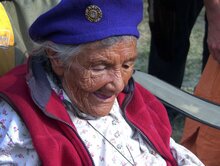Benjamin Boller


Benjamin Boller is associate professor in the department of psychology at the Université du Québec à Trois-Rivières, and a researcher at the Research Centre of the Institut universitaire de gériatrie de Montréal. After completing a PhD in psychology at Université Paris Descartes, where he focused on memory processes in Alzheimer's disease, he pursued a postdoctoral fellowship in neuropsychology at Université de Montréal, exploring the impact of cognitive intervention programs on people with subjective cognitive decline. His current research focuses on cognitive aging, both normal and pathological, with a particular interest in the factors modulating the effects of age on the brain and cognition, and in the development of innovative interventions to prevent cognitive decline.
The project
Title: Exploring early markers of Alzheimer's disease and developing adapted cognitive tests: An inclusive Franco-Quebec collaboration for Aboriginal and aging populations
« This research project aims to deepen our understanding of the early markers of Alzheimer's disease and to develop cognitive assessment tools adapted to Quebec's aging aboriginal populations. The project is structured around two main objectives. The first concerns the study of neurophysiological and behavioural changes in episodic memory in the early stages of Alzheimer's disease. This research draws on data from two longitudinal studies, one in Quebec and the other in France (CIMA-Q and Insight-preAD), enabling a comparative analysis between Quebec and French populations. In collaboration with Université Paris Cité, this project aims to identify neurocognitive and neuroanatomical markers of the disease in its prodromal phase, in order to strengthen early detection capabilities. The second objective is to develop cognitive tests adapted for the aboriginal populations of Mauricie and Centre-du-Québec, taking into account their cultural and linguistic particularities. Currently, screening tools for memory disorders are not adapted to these communities, which limits diagnostic accuracy and access to appropriate follow-up. This project will be carried out in collaboration with the Groupe Réseau Initiatives Autochtones of the Université du Québec à Trois-Rivières, and will draw on methodologies developed by researchers specializing in cultural adaptation. »
Hosting institution: Institut de Psychologie – Université Paris Cité
Selective Bibliography
- Gosselin, C. & Boller, B. (2024). The impact of retirement on executive functions and processing speed: Findings from the Canadian Longitudinal Study on Aging. Aging, Neuropsychology, and Cognition, 31, 1-15.
- Jobin, B., Roy-Côté, F., Frasnelli, J., & Boller, B. (2023). Olfaction and declarative memory in aging: a meta-analysis. Chemical Senses. bjad045.
- Belleville, S., Cuesta, M., Bieler-Aeschlimann, M., Giacomino, K., Widmer, A., Mittaz Hager, A. G., Perez-Marcos, D., Cardin, S., Boller, B., Bier, N., Aubertin-Leheudre,M., Bherer, L., Berryman, N., Agrigoroaei, S., & Demonet, J. F. (2023). Pre-frail older adults show improved cognition with StayFitLonger computerized home-based training: a randomized controlled trial. GeroScience, 45(2), 811-822.
- Nadeau, P. A., Jobin, B., & Boller, B. (2023). Diagnostic sensitivity and specificity of cognitive tests for mild cognitive impairment and Alzheimer's disease in patients with Down syndrome: a systematic review and meta-analysis. Journal of Alzheimer’s Disease, 95(1), 13-51.



Nancy Jones

Arezou Azad

Carla Rita Palmerino



